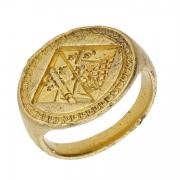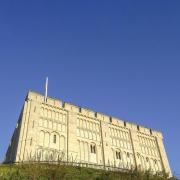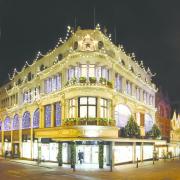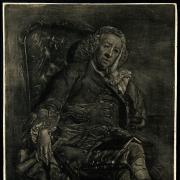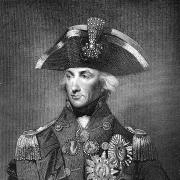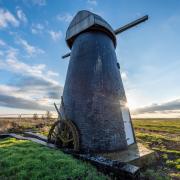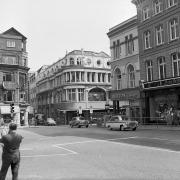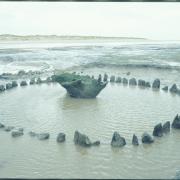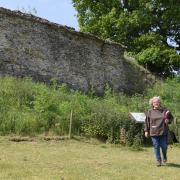Chris Armstrong looks at the life of a noted man of business; Sir George White – shoe manufacturer, temperance campaigner, educationalist and enlightened entrepreneur
In the second half of the 19th century Norwich was blessed with a small clutch of enlightened entrepreneurs. Their vision and commitment to what later became known as the Protestant Work Ethic pulled the city back to a fair degree of prosperity after the disastrous decline of the woollen and worsted industry which had been the backbone of the city’s wealth for so long.
Most of these men were non-conformists, and their nature inclined them to use their wealth and position to benefit the community as well as grow their own fortunes.
Perhaps the best known, and certainly the best remembered, of this group were Colman and Caley, each of whom has featured in this column before, but George White, slightly younger than either, was not far behind them in his achievements.
And unlike Caley, who came from a wealthy background, and Colman, whose achievement was to grow hugely the small family business, White had to depend entirely on his own abilities to get a start in the commercial world.
Like Colman he came from a small business background, but his father, a boot manufacturer in a very modest way of business in Bourne, felt that his business could support only one member of the next generation, and George was the younger son. One of the firm’s suppliers was the Norwich leather merchant, Howlett and Tillyard.
When John Howlett, at the end of a tiring week travelling through Norfolk and Lincolnshire by horse and cart selling his wares, called at White’s business the 14-year-old George helped him unload his samples and took part in the negotiations which followed. He must have made a good impression because when White senior enquired whether Howlett would be willing to take George as an apprentice he got a positive response, and two years later, in 1856, George moved to Norwich to start work.

He must have been a rather precocious boy – it was said that by the age of 12 he could name every parliamentary constituency and identify the relevant MPs, that he had already decided to nail his colours to the Liberal mast, and that he had formed an ambition to enter Parliament himself. Arriving in Norwich after leaving Bourne Grammar School, he determined to continue his education, enrolling for voluntary classes run on a pro bono basis by a local lawyer on mathematics and languages. These were offered at 6am so the boys could be at work by 8am. For an initial wage of eight shillings per week, George started working on the factory floor and then in the office as a junior clerk.
The precocious boy was developing into the earnest young man. At 17 he signed the pledge and became an active lifelong campaigner in the cause of temperance, finally being elected as President of the Baptist Total Abstinence Association.
His involvement with the Baptist church was deep. The Rev Gould, minister at St Mary’s, was so impressed by the young man’s commitment and oratory that he predicted a parliamentary future for him.
After about four years, mainly spent in clerical duties, George asked whether he could go on the road as a representative. He could see that a spell in such a role was traditional in the company as a step on the way to management and he was an ambitious young man.
Initially he was told he was too young for such a step, but it wasn’t long before he was given the chance to show his mettle. The role of a representative in those days frequently involved spending a whole week away, travelling long distances by horse and cart and staying overnight in small inns.
These inns depended heavily on commercial travellers for their business, providing stabling for the horses and encouraging the representatives by setting up a ‘commercial’s’ table in the bar, where all those staying could spend an evening in the company of others of their ilk, comparing notes, telling stories and enjoying a few drinks together.

The accepted practice was that that during the evening a ‘tab’ would be kept recording all the food and drink consumed at the table, and at the end of the evening the total cost would be added up and shared equally without regard to individual consumption. This was a problem for George – as a total abstainer and militant temperance campaigner he initially declined to pay for alcohol consumed by his fellow travellers.
This was not popular and he found himself cast adrift from his colleagues. Perhaps anxious to stay in the group he devised a plan – approaching all the landlords individually and asking them to charge a special premium rate for the food he had eaten, even where the others were paying less for the same meal.
In this way, he was contributing an equal amount to his fellows towards the total cost. Rather hypocritically he was able to tell himself that he hadn’t paid for any alcoholic consumption.
The abilities of George White had been recognized by his employers from an early stage and, at the age of 25 he got his big break. The company was changing its focus to reflect the rapid changes occurring in the shoe industry, and moved significantly into manufacture rather than just acting as leather suppliers.
The manager who had been chosen to run the shoe department was taken ill and George White was chosen as his replacement. He grasped the chance eagerly and made such a huge success of it that 10 years later he was invited to become a partner in the firm purely on merit and without the need to provide any capital.
The changes in the shoe industry stemmed from mechanisation. Until recently shoe making in the cities had been carried out by homeworkers individually manufacturing parts of the shoe. In the country there was generally a village cobbler who would produce what were known as ‘straights’ – two identical boots which could be forced uncomfortably on to either foot.

Mechanization changed everything – for the first time it became worthwhile to manufacture shoes in different sizes and designs, and to bring to a wider public the kind of comfort previously available only to those wealthy enough to afford custom-made footwear. To make these new shoes generally available there was something of a retail revolution as shops started carrying stock, and chains of specialist retail outlets opened up.
The result was that shoe factories began to grow, and George White prospered accordingly. At one time the Howlett & White factory (later Norvic Shoes) was reputed to be the largest single building shoe factory in the country.
So dominant did the shoe become in the company’s business that a valuation carried out in 1885, when the partnership was renewed, assessed the stock of completed shoes as having a value of more than twice that of the factory and plant itself.
Examining the history of the company there is little doubt that George was the dominant partner and he ran a tight, but fair, ship. Arriving just one minute late for work led to pay being docked for 15 minutes, but, aware that many of his workforce could not afford a reliable timepiece, he paid an honorarium to the verger of the nearby St George’s church to ensure that the clock was always fully wound and accurate so that staff were aware of the time.
He set an example by his own behaviour, arriving early, leaving late, and having his lunch brought to him at his desk. There is little doubt that he was greatly respected by the workforce – he understood their situation having started on the factory floor himself. It would also be true to say that he genuinely cared for their wellbeing.
This mutual regard was never more obvious than in 1897 when there was a prolonged city-wide strike for a minimum wage. One week he was approached by James Mason, a fellow Liberal councillor, who was the local official of the Operatives Union. Mason explained that there had been a delay in the arrival of the funds from the Union’s office for strike pay.

George White, appalled at the thought of the wives and families of his own striking workers having to go hungry, promptly guaranteed the payment – probably not a move popular with his fellow employers. When Mason was sacked by his original employer after the strike ended unsuccessfully, George White promptly gave him a job.
Outside work White, like so many other non-conformists, was anxious to become involved in public life in a way which had been denied them so long by the provisions of the Test Acts. He chaired the Norwich School Board for over 15 years, was a magistrate and later became MP for North West Norfolk, following the retirement of the noted demagogue, Joseph Arch.
Education remained his primary interest throughout his life. At 16 he had been taking Sunday School lessons, and later he founded a new adult club at St Mary’s to provide instruction in sums and spelling to working men. His commitment to education is remembered today with a school in the city named after him.
Although education may have been the original motivation for setting up the adult club its activities extended much further, as it provided a savings club, a limited amount of income in the event of sickness or unemployment and even had a section called the ‘Goose Club’ which provided members with a bird at Christmas. White, who claimed that establishing the club had been ‘one of the best works of his life’, was particularly pleased with the provision of geese because it cocked a snook at publicans who had previously run such clubs. Another blow for tee-totalism!
Sir George White deservedly commanded respect and admiration from those involved with him. He was not, perhaps, blessed with much by way of humour and must have been fairly heavy weather conversationally. Whether he commanded the affection of others as well as their respect seems less certain, but the extent of his achievements both commercial and in public service mark him as a man to remember.
A fuller version of the story of Sir George White can be found in Chris Armstrong’s book Mustard, Boots and Beer (Larks Press, 2014)





